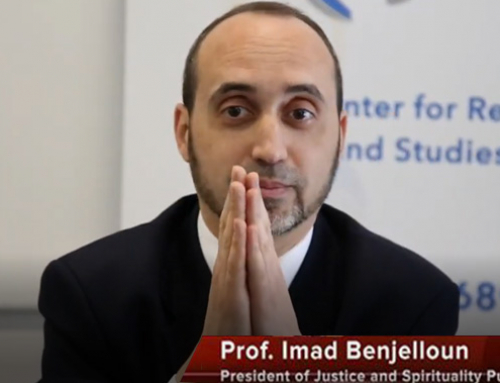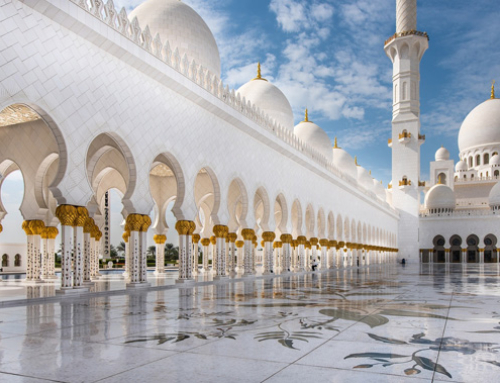Amina Chibani
October 22, 2012
The word Ihsan comes from the root word ḥusn meaning beauty. In the Islamic context, it has many connotations. The main three are the ones we find in Quran and prophetic tradition:
Ihsan is to worship God as if we could see Him and if we can’t then be aware that He sees us. Ihsan is to treat with excellence people and all living things around us. Ihsan is to excel in one’s work and dealings; perform them with utmost attention, care and integrity.
The sum total of all these qualities constitutes what man was created to be. The beloved Muhammad peace and blessings be upon him was the quintessential embodiment of this state, but through the centuries, it was, to certain degrees, visited by countless lucky souls. The good news is that it is open to all who are willing and ready to roll their sleeves up and get their hands dirty cleaning the muck of their nafs.
A muḥsin in relation to his Lord is in one of two states, either a state of witnessing, or a state of watchfulness of God’s gaze upon his heart- a lower rank indeed compared to the former but excellent nonetheless. This is a state that builds on the former two: islām and iman. It can never stand on its own hovering over ruins. There is no iman without outward practices of islām and no ihsan without the inward beliefs of iman.
Ihsan, at this level, indicates when a slave has knocked long enough on the Merciful’s door through obligatory acts of worship that God loves, and then through supererogatory acts of worship that make him beloved to God. It is when enough work has been done on the nafs during the former stages that from the panicky, jumpy, tense state of the beginnings, it blossoms into a poised, serene and content soul worthy of the King’s presence. Scholars talk about those who reached this state through relentless work and good companionship in the following terms:
Gnostics of God whom God has aided to perform the best of deeds, who were protected from actions that are against His command. (…) He removed the veil for them, so they worshiped Him as tough they could see Him, and were occupied only by His love. Then He made them privy to the wonders of His creation, and the miracles of His wisdom, and drew them ever closer to His Divine Glory, and laid under them the carpet of the delight of His companionship, and filled their hearts with the attributes of His beauty and rigor, and made the suns of His light rise in them; vaults for His secrets, and safes for His knowledge, and (themselves) treasures of subtle giving. Then by them, He revived the dīn, and endowed the seekers, and saved the people, and reformed the land. (1)
When one’s inner life becomes that rich, the scent of their fragrant purified soul inevitably spreads to their environment. All they see in creation is the hand that made it. Like lady Aisha, who used to dip the money of charity in perfume before giving it away and when asked, would say that it fell directly in God’s hand before reaching the beggar’s- no anthropomorphism intended, only the powerful conviction that actions are only worth the intention behind them. The intention of muḥsins is pure and unadulterated, God and His good pleasure, just that. When it comes to people, they are truthful, trustworthy, generous, and forgiving because “The best amongst you are the best in character and manners.” (2) Like their beloved model, when they see injustice and oppression they are unstoppable, doing their best to right the wrong and restore justice. They don’t just do good, they do it beautifully and with grace. The least of their good deeds is their radiant smile, which heals when actions fall short. In fact, even the presence and mention of such people becomes a potent and active force that revives souls and awakens consciences.
Ihsan of the people of ihsan also touches their duties, be they sacred or mundane. They do them as best they can be done and a little better. An example of this is mentioned in a hadith where the prophet, God bless him and grant him peace, commands that one be considerate when performing their ritual sheep slaughter, not to brandish the blade exacerbating the poor beast’s anguish, and to sharpen it to inflict as merciful and quick a kill as possible. From this hadith, extrapolations can be made on all other aspects of the work of a muḥsin. Here the journey is its own reward: the joy of a work done under the pleased omniscient gaze of God. But the Generous promised even more at the end of a section in Surat Ar-Raḥmān that enumerated all the exquisite rewards awaiting the people of ihsan in the Garden and ended with an even more seductive prospect: “is the reward of ihsan anything other than ihsan.” (3) If the ihsan of creatures is intended to be that beautiful, how can one fathom the extent of the ihsan of The Creator of beauty.
Ihsan is why Islam as a religion exists. It is when the soul prevails over all and reconnects with its primordial nature. It entails a long and strenuous struggle-unless God wills otherwise and allows it to be; the work to be done involves one’s relationship with the Creator and creation, animate and inanimate. Volumes and volumes were written to describe the openings that one experiences during this final and ultimate stage in the ascend toward our Lord, but they are all unanimous that unless the journey is effectively taken, there is no way one could fathom the rapture and pure joy of basking in the love of God.










